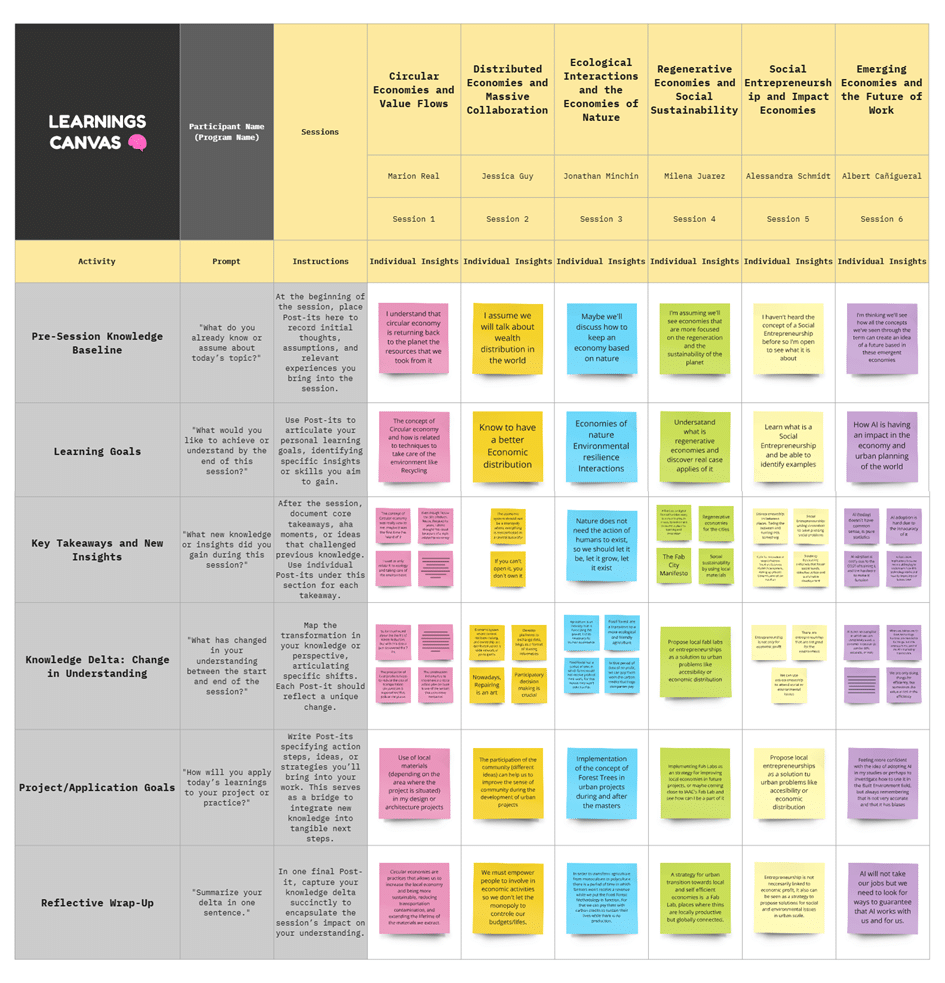Over the course of 6 weeks we had the opportunity to be introduced to emerging economies, a concept that from my initial perspective was outside of urban design, but as the classes progressed, I realized its relevance to urban planning and to the current world in general.

CIRCULAR ECONOMIES AND VALUE FLOWS
The circular economy is proposed as a new paradigm for replacing our current, mostly linear economy. In contrast to a “take-make-waste” approach which contributes to global sustainability challenges, the circular economy embraces a philosophy of slowing down consumption, with a final vision to eventually eliminate waste and pollution.
The production of local products helps to reduce the cost of transportation (importation & exportation) that pollute the planet.
The construction industry has to implement a circular action plan because is one of the sectors that uses more resources.
Circular economies are practices that allows us to increase the local economy and being more sustainable, reducing transportation contamination, and extending the lifetime of the materials we extract.
DISTRIBUTED ECONOMIES AND MASSIVE COLLABORATION
In this class we explored how design supports decentralised economic models and large-scale collaboration, leveraging digital platforms and local networks to democratise resources and promote resilient communities.
A decentralised economic model is an economic system where control, decision-making, and ownership are distributed across a wide network of participants rather than being concentrated in a central authority. These models aim to create more equitable, resilient, and democratic structures by empowering individuals or small groups to have direct involvement in economic activities, governance and value exchange.
We must empower people to involve in economic activities so we don’t let the monopoly to controle our budgets/lifes.
SOCIAL ENTREPRENEURSHIP AND IMPACT ECONOMIES
We talked about the concept of entrepreneurship and tried to defineit as Taking the between and turning into something, also how to go from invention to innovation; and finally we talk out loud that there are entrepreneurship that are not good for the environment.
Entrepreneurship is not neccesarily linked to economic profit, it also can be seen as a strategy to propose solutions for social and environmental issues in urban scale.
REGENERATIVE ECONOMIES AND SOCIAL SUSTAINABILITY
This session was mostly about the concetp of Fab Lab.
Fab City Global Initiative proposes to look at cities and regions infrastructure as an ecosystem, that is complementary, and multiscalar.
A strategy for urban transition towards local and self efficient economies is a Fab Lab. Propose local fab labs or entrepreneurships as a solution tu urban problems like accesibility or economic distribution. The Fab City Manifesto has ten principles to enable the urban transition towards locally productive and globally connected cities (Ecological, Inclusive, Glocalism, Participatory, Economic growth & employment, Locally productive, People-centred, Holistic, Open source philosophy, Experimental)
ECOLOGICAL INTERACTIONS AND THE ECONOMIES OF NATURE
Our designs have to work and generate value, revenue, not stuck in research. That’s hard to do ethically. We need to rethink the system we live today using data.
Agriculture is an industry that is harvesting the planet, but its necessary for human sustenance. Food forest are a transition to a more ecological and friendly agriculture. Food forest has a period of time in which farms would not receive profit of their work. For that reason they won’t take the risk. In that period of time of no profit, we can pay them woth the carbon credits that huge companies pay.
In order to transform agriculture from monoculture to polyculture there is a period of time in which farmers won’t receive a revenue while we put the Food Forest Methodology in function. For that we can pay them with carbon credits to sustain their lives while there is no production.
EMERGING ECONOMIES AND THE FUTURE OF WORK
Four our final class we explored the question of Will AI take my job?
AI (today) doesn’t have common sense, is pure statistics. We tend to anthropomorphize AI, refering to it like it feels, thinks, reasons, decides, imagines, hallucinates, grates or has an opinion. But in reality this technology is in the Peak of Inflated Expectations, and there’s a chance that it goes to the trough of disillusionment in some time, before going to the Plateau of productivity.
AI adoption is hard due to the innacuracy of it. AI adoption is costly due to the COST of training it and the hardware to make it function. AI has LEGAL implications because we are still trying to understand how this technology works and how its impacting our human laws. AI is not an autopilot in which we can completely trust, it commits mistakes (it can be 90% accurate, or not).
When we ask too much from technology, humans are needed to fix things, but this process is not part of the AI’s marketing mainstream. AI is not a subject. If people are losing jobs is because of people, companies and institutions putting their economical interest over the community well being. We are only doing things for efficiency, but sometimes the value is not in the efficiency.
AI will not take our jobs but we need to look for ways to guarantee that AI works with us and for us.

